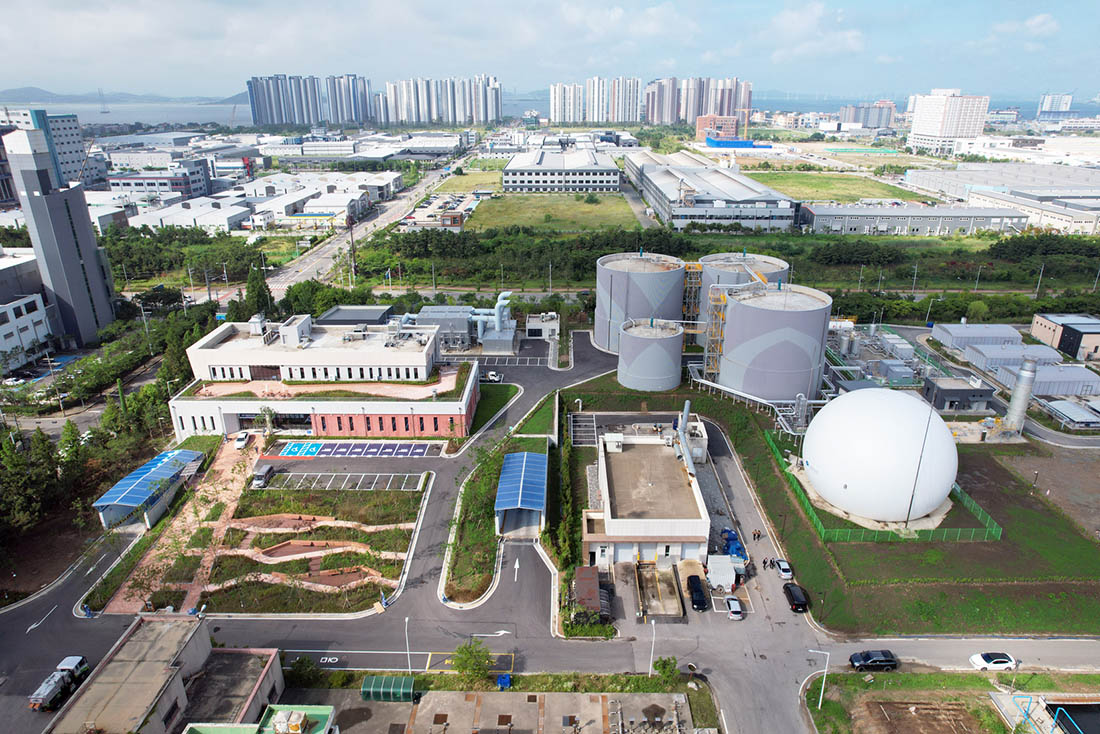Press Release
Hyundai E&C Begins Full Operation of Organic Waste Biogas Facility
▲ Hyundai E&C completes Korea's first privately invested 33,430㎡ integrated biogas facility
… Processing organic waste such as sewage sludge, food waste, and manure to produce biogas
… Refining biogas to produce city gas sufficient for about 8,300 households per day, supplying it across Siheung City
▲ Leading the next-generation energy market with unrivalled capabilities based on continuous R&D and business experience
… Enhancing technological stability and competitiveness through securing core technologies for resource-circulating energy and project execution
… Pioneering the establishment of a sustainable ecosystem with competitiveness in biogas, hydrogen, CCUS, and other fields

[ Siheung Clean Energy Center ]
Hyundai E&C has completed the construction of the Siheung Clean Energy Center, Korea's first privately invested integrated biogas facility, and has begun full-scale biogas production.
On Wednesday, the 3rd, Hyundai E&C celebrated the completion of the Siheung Clean Energy Center with a ceremony at the Water Environment Center in Siheung, Gyeonggi Province, marking the beginning of resource-circulating biogas production. The event was attended by Siheung Mayor Lim Byeong-taek, National Assembly member Jo Jung-sik, Hyundai E&C Civil Engineering Division Head Kang Yong-hee, and KDB PF1 Director Kim Tae-hee, along with other local government and participating organization officials.
The Siheung Clean Energy Center, located within the Water Environment Center in Siheung, Gyeonggi Province, is an integrated treatment facility covering 33,430㎡. It processes 540㎥ of sewage sludge, 145㎥ of food waste, and 60㎥ of manure per day, all of which are organic wastes generated in Siheung. By reducing and converting these wastes into energy, the center enhances treatment stability while producing biogas.
Hyundai E&C began construction on this project in March 2021 and, after 39 months of work, including 10 months of commissioning, completed it on the 28th of last month. From the day of the completion, the center has been producing and supplying city gas and Hyundai E&C will operate the center for the next 20 years.
At the Water Environment Center, organic waste such as sewage sludge, food waste, and manure, including methane, is collected and transferred to the Clean Energy Center. There, the wastes undergo several stages: pre-treatment, anaerobic digestion, digestate treatment, and wastewater treatment.
The biogas produced through this process is solidified at a refinery facility to produce about 4.6 million N㎥ of city gas per year. This is sufficient for use by about 8,283 households per day and is supplied throughout Siheung City.
The full-scale operation of the Siheung Clean Energy Center has improved treatment efficiency, making it possible to accept the rapidly increasing amount of organic waste that has grown along with urban development and population growth. In addition, by creating a sealed treatment environment through high-concentration odor removal equipment and undergrounding the facility, it has been able to effectively address the odor problem that has been an ongoing issue.
Hyundai E&C has been focusing on research and investment in waste resource recycling. Since establishing a pilot facility in Cheongna, Incheon, in 2008 to start technology development, the company has acquired environmental new technology and green certifications related to biogas production from organic waste. It has also registered numerous patents domestically and internationally, striving to secure core technologies.
Hyundai E&C's Chungju Food Waste Bioenergy Center, which the company constructed and now operates, processes food waste to extract biogas, producing hydrogen that is supplied to a nearby hydrogen convergence charging station. Additionally, Hyundai E&C is actively engaged in projects such as the “Gumi City Integrated Biogas Facility Private Investment Project” and the “Inje Integrated Biogas Energy Facility National Project.” Through these efforts, the company is enhancing technological stability while continuously strengthening the competitiveness of its resource-circulating energy initiatives.
A Hyundai E&C source explained, “We believe that it is important to build a resource-cycling energy system for future generations, and we are actively participating in a number of projects with technologies and know-how accumulated through related R&D and demonstrations.” “We will build a sustainable ecosystem by actively driving the next-generation energy market based on our industry-leading competitiveness in various fields, including not only biogas but also hydrogen and CCUS.”
![Siheung Clean Energy Center Organic Waste Processing and Energy Conversion Process [Siheung Clean Energy Center Organic Waste Processing and Energy Conversion Process] Removal of contaminants Integrated processing Microbial decomposition (anaerobic digestion) Biogas storage and purification City gas supply Organic waste intake](/FileContents/EditorImg/20240723/[첨부2] 시흥클린에너지센터 유기성 폐기물 처리 및 에너지화_en_1100.jpg)


